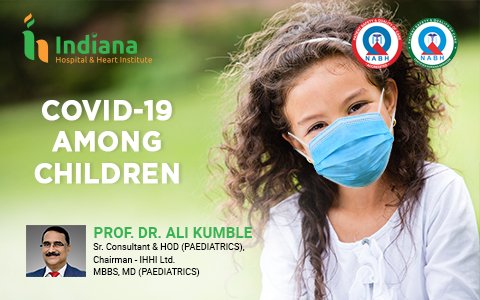COVID-19 AMONG CHILDREN By Dr. Ali Kumble
September 25, 2020
(Children are defined as those aged 1 month to 18 years for the purpose of this document)
Incidence
There are reports of children being afflicted with Covid-19 fever globally. However, a true picture on the incidence of SARS-Covid-19 infection among children is yet to emerge owing to the lack of widespread testing, and the priority in testing being given to adults and those with symptoms. The rate of hospitalization among children is also comparatively fewer in number.
Infection and transmission among children

There is, as yet, no clear picture on the susceptibility and transmission of Covid-19 among children. Recent evidence suggests that children are likely to have higher viral load in Nasopharynx, and hence transmit the disease.
Community social distancing, closure of schools, restrain on outdoor games and restricted indoor living may explain the low incidence of Covid-19 among children.
Symptoms and severity of Covid-19
Incubation period is 2-14 days with an average of 6 days.
Signs and symptoms
Fever, fatigue, headache, myalgia, cough, nasal congestion, rhinorrhea (runny nose), new loss of smell/taste, sore throat, shortness of breath or difficulty in breathing, abdomen pain, diarrhea, nausea/vomiting, poor appetite/poor feeding.
The most important symptoms in children are cough and/or fever, but a majority will be asymptomatic or may have non-specific symptoms. These are similar to other infectious or non-infectious processes.
Severity of illness: Children with Covid-19 infection are less likely to develop severe illness compared to adults. Those with associated medical conditions and those below 1 year are at an increased risk. Similar to adults, children with severe Covid-19 infection may develop respiratory failure, coagulopathy, myocarditis, shock acute renal failure and multi system failure. And on rare occasions, it can present itself as intussusception, diabetic keto acidosis.
Children infected with Covid-19 are also at the risk of developing paediatric multisystem inflammatory syndrome (MIS-C) later. In such cases, clinical features overlapping with toxic shock syndrome and atypical Kawasaki disease may also be seen. These patients tend to show a very high inflammatory markers, and will test positive in antibody test for SARS-Covid-19 infection.
Testing & isolation
RTPCR, Antigen test based on clinical criteria is recommended as in adults.
Those who have had close contact (within 6 feet — total 15 minutes or more) with a confirmed/probable Covid-19 infected person should be tested. Those who are asymptomatic, but have had close contact should also be tested.
Laboratory and radiographic findings
- Abnormalities of WBC count either increased or decreased lymphocyte count.
- Mildly elevated inflammatory markers.
- Mildly elevated liver enzymes.
- Unilateral/bilateral infiltrates, consolidation on Chest X-ray/CT chest.
- Ground glass opacities in CT chest.
Management
One should consider a child’s clinical presentation, requirement of supportive care, underlying medical conditions and the ability of caregivers for homecare.
Currently there is no specific drug approved by the authority for treatment of Covid-19. Treatment mainly includes supportive care as well as prevention and management of complications.
Dexamethosone: This drug is beneficial for children with Covid-19 respiratory disease and those who require respiratory support such as mechanical ventilation.
Remdesivir: The safety and efficacy of this drug in children has not yet been evaluated. It is administered to children who are hospitalized and who require supplemental oxygen and other respiratory support. It can be administered for 5 days.
Treatment of MIS-C: There is limited information available on the risk factor involved; pathogenesis, clinical course and treatment. Supportive care is the mainstay. Many centres consider the use of IVIG, steroid and other immunomodulators (including anti IL-1, anti IL-6), antiplatelet and anticoagulant therapy. It is important to remember that children infected with Covid-19 can have other serious conditions, and hence broad differentials must be considered and evaluated.
Immunization and child welfare: Measures adopted by the community have resulted in the decline in OP pediatric visits, including regular vaccination. Health care providers should work with families to make sure that children are immunized up to date with all recommended vaccinations, and also identify children who have missed it, especially those below 24 months of age.
Developmental surveillance, early childhood screening, and screening of newborns to evaluate feeding patterns, weight gain, hydration and jaundice should be carried out by health care provider even during the pandemic. Pediatric health care providers should incorporate into their curriculum education on prevention of everyday infection measures such as hand hygiene, social distancing, wearing mask as well as information on stress and coping. Primary care practitioner should continue to use infection-prevention strategies.
(By Dr. Ali Kumble is the head of Paediatrics, Indiana Hospital and chairman of IHHI Ltd., Mangaluru)
